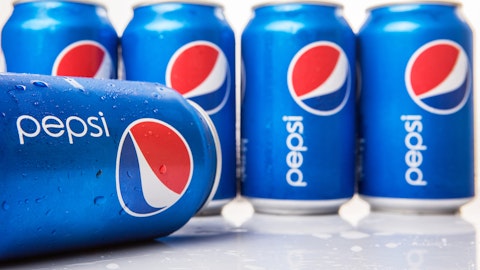We are still in an overall bull market and many stocks that smart money investors were piling into surged through the end of November. Among them, Facebook and Microsoft ranked among the top 3 picks and these stocks gained 54% and 51% respectively. Hedge funds’ top 3 stock picks returned 41.7% this year and beat the S&P 500 ETFs by 14 percentage points. Investing in index funds guarantees you average returns, not superior returns. We are looking to generate superior returns for our readers. That’s why we believe it isn’t a waste of time to check out hedge fund sentiment before you invest in a stock like PepsiCo, Inc. (NASDAQ:PEP).
Is PepsiCo, Inc. (NASDAQ:PEP) a buy right now? The best stock pickers are turning bullish. The number of long hedge fund positions advanced by 2 recently. Our calculations also showed that PEP isn’t among the 30 most popular stocks among hedge funds (click for Q3 rankings and see the video below for Q2 rankings).

Video: Click the image to watch our video about the top 5 most popular hedge fund stocks.
Why do we pay any attention at all to hedge fund sentiment? Our research has shown that hedge funds’ large-cap stock picks indeed failed to beat the market between 1999 and 2016. However, we were able to identify in advance a select group of hedge fund holdings that outperformed the Russell 2000 ETFs by 40 percentage points since May 2014 (see the details here). We were also able to identify in advance a select group of hedge fund holdings that’ll significantly underperform the market. We have been tracking and sharing the list of these stocks since February 2017 and they lost 27.8% through November 21, 2019. That’s why we believe hedge fund sentiment is an extremely useful indicator that investors should pay attention to.

Donald Yacktman of Yacktman Asset Management
Unlike the largest US hedge funds that are convinced Dow will soar past 40,000 or the world’s most bearish hedge fund that’s more convinced than ever that a crash is coming, our long-short investment strategy doesn’t rely on bull or bear markets to deliver double digit returns. We only rely on the best performing hedge funds‘ buy/sell signals. We’re going to take a peek at the fresh hedge fund action regarding PepsiCo, Inc. (NASDAQ:PEP).
What have hedge funds been doing with PepsiCo, Inc. (NASDAQ:PEP)?
Heading into the fourth quarter of 2019, a total of 57 of the hedge funds tracked by Insider Monkey were bullish on this stock, a change of 4% from the previous quarter. Below, you can check out the change in hedge fund sentiment towards PEP over the last 17 quarters. So, let’s see which hedge funds were among the top holders of the stock and which hedge funds were making big moves.

According to publicly available hedge fund and institutional investor holdings data compiled by Insider Monkey, Yacktman Asset Management, managed by Donald Yacktman, holds the number one position in PepsiCo, Inc. (NASDAQ:PEP). Yacktman Asset Management has a $801.3 million position in the stock, comprising 9.8% of its 13F portfolio. On Yacktman Asset Management’s heels is Cliff Asness of AQR Capital Management, with a $754.7 million position; 0.9% of its 13F portfolio is allocated to the stock. Some other members of the smart money with similar optimism include Renaissance Technologies, David E. Shaw’s D E Shaw and Ric Dillon’s Diamond Hill Capital. In terms of the portfolio weights assigned to each position Yacktman Asset Management allocated the biggest weight to PepsiCo, Inc. (NASDAQ:PEP), around 9.85% of its portfolio. Gabalex Capital is also relatively very bullish on the stock, earmarking 2.96 percent of its 13F equity portfolio to PEP.
With a general bullishness amongst the heavyweights, some big names were breaking ground themselves. Echo Street Capital Management, managed by Greg Poole, established the most outsized position in PepsiCo, Inc. (NASDAQ:PEP). Echo Street Capital Management had $5.9 million invested in the company at the end of the quarter. Parvinder Thiara’s Athanor Capital also made a $1 million investment in the stock during the quarter. The following funds were also among the new PEP investors: David Costen Haley’s HBK Investments, Ben Levine, Andrew Manuel and Stefan Renold’s LMR Partners, and Kahn Brothers.
Let’s check out hedge fund activity in other stocks similar to PepsiCo, Inc. (NASDAQ:PEP). These stocks are Toyota Motor Corporation (NYSE:TM), Anheuser-Busch InBev SA/NV (NYSE:BUD), Oracle Corporation (NYSE:ORCL), and China Mobile Limited (NYSE:CHL). This group of stocks’ market valuations are similar to PEP’s market valuation.
| Ticker | No of HFs with positions | Total Value of HF Positions (x1000) | Change in HF Position |
|---|---|---|---|
| TM | 11 | 243035 | 3 |
| BUD | 19 | 1800212 | 1 |
| ORCL | 50 | 4360689 | -11 |
| CHL | 12 | 386022 | -1 |
| Average | 23 | 1697490 | -2 |
View table here if you experience formatting issues.
As you can see these stocks had an average of 23 hedge funds with bullish positions and the average amount invested in these stocks was $1697 million. That figure was $3745 million in PEP’s case. Oracle Corporation (NYSE:ORCL) is the most popular stock in this table. On the other hand Toyota Motor Corporation (NYSE:TM) is the least popular one with only 11 bullish hedge fund positions. Compared to these stocks PepsiCo, Inc. (NASDAQ:PEP) is more popular among hedge funds. Our calculations showed that top 20 most popular stocks among hedge funds returned 37.4% in 2019 through the end of November and outperformed the S&P 500 ETF (SPY) by 9.9 percentage points. Unfortunately PEP wasn’t nearly as popular as these 20 stocks and hedge funds that were betting on PEP were disappointed as the stock returned -0.9% during the first two months of the fourth quarter and underperformed the market. If you are interested in investing in large cap stocks with huge upside potential, you should check out the top 20 most popular stocks among hedge funds as 70 percent of these stocks already outperformed the market in Q4.
Disclosure: None. This article was originally published at Insider Monkey.




